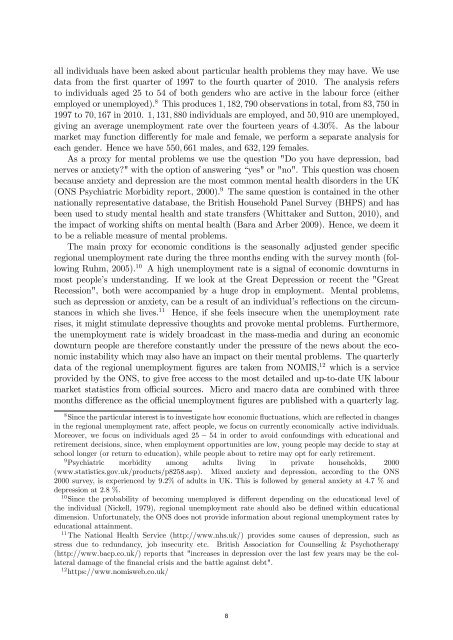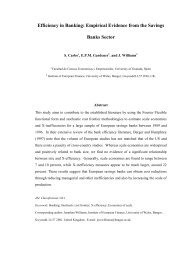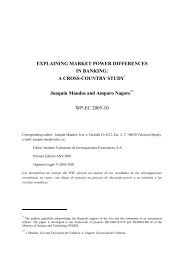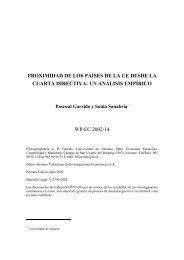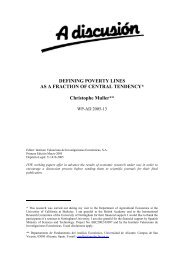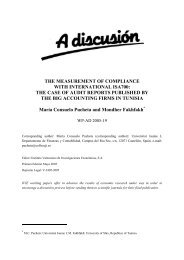Download PDF - Ivie
Create successful ePaper yourself
Turn your PDF publications into a flip-book with our unique Google optimized e-Paper software.
all individuals have been asked about particular health problems they may have. We use<br />
data from the …rst quarter of 1997 to the fourth quarter of 2010. The analysis refers<br />
to individuals aged 25 to 54 of both genders who are active in the labour force (either<br />
employed or unemployed). 8 This produces 1; 182; 790 observations in total, from 83; 750 in<br />
1997 to 70; 167 in 2010. 1; 131; 880 individuals are employed, and 50; 910 are unemployed,<br />
giving an average unemployment rate over the fourteen years of 4:30%. As the labour<br />
market may function di¤erently for male and female, we perform a separate analysis for<br />
each gender. Hence we have 550; 661 males, and 632; 129 females.<br />
As a proxy for mental problems we use the question "Do you have depression, bad<br />
nerves or anxiety?" with the option of answering “yes" or "no". This question was chosen<br />
because anxiety and depression are the most common mental health disorders in the UK<br />
(ONS Psychiatric Morbidity report, 2000). 9 The same question is contained in the other<br />
nationally representative database, the British Household Panel Survey (BHPS) and has<br />
been used to study mental health and state transfers (Whittaker and Sutton, 2010), and<br />
the impact of working shifts on mental health (Bara and Arber 2009). Hence, we deem it<br />
to be a reliable measure of mental problems.<br />
The main proxy for economic conditions is the seasonally adjusted gender speci…c<br />
regional unemployment rate during the three months ending with the survey month (following<br />
Ruhm, 2005). 10 A high unemployment rate is a signal of economic downturns in<br />
most people’s understanding. If we look at the Great Depression or recent the "Great<br />
Recession", both were accompanied by a huge drop in employment. Mental problems,<br />
such as depression or anxiety, can be a result of an individual’s re‡ections on the circumstances<br />
in which she lives. 11 Hence, if she feels insecure when the unemployment rate<br />
rises, it might stimulate depressive thoughts and provoke mental problems. Furthermore,<br />
the unemployment rate is widely broadcast in the mass-media and during an economic<br />
downturn people are therefore constantly under the pressure of the news about the economic<br />
instability which may also have an impact on their mental problems. The quarterly<br />
data of the regional unemployment …gures are taken from NOMIS, 12 which is a service<br />
provided by the ONS, to give free access to the most detailed and up-to-date UK labour<br />
market statistics from o¢ cial sources. Micro and macro data are combined with three<br />
months di¤erence as the o¢ cial unemployment …gures are published with a quarterly lag.<br />
8 Since the particular interest is to investigate how economic ‡uctuations, which are re‡ected in changes<br />
in the regional unemployment rate, a¤ect people, we focus on currently economically active individuals.<br />
Moreover, we focus on individuals aged 25 54 in order to avoid confoundings with educational and<br />
retirement decisions, since, when employment opportunities are low, young people may decide to stay at<br />
school longer (or return to education), while people about to retire may opt for early retirement.<br />
9 Psychiatric morbidity among adults living in private households, 2000<br />
(www.statistics.gov.uk/products/p8258.asp). Mixed anxiety and depression, according to the ONS<br />
2000 survey, is experienced by 9.2% of adults in UK. This is followed by general anxiety at 4.7 % and<br />
depression at 2.8 %.<br />
10 Since the probability of becoming unemployed is di¤erent depending on the educational level of<br />
the individual (Nickell, 1979), regional unemployment rate should also be de…ned within educational<br />
dimension. Unfortunately, the ONS does not provide information about regional unemployment rates by<br />
educational attainment.<br />
11 The National Health Service (http://www.nhs.uk/) provides some causes of depression, such as<br />
stress due to redundancy, job insecurity etc. British Association for Counselling & Psychotherapy<br />
(http://www.bacp.co.uk/) reports that "increases in depression over the last few years may be the collateral<br />
damage of the …nancial crisis and the battle against debt".<br />
12 https://www.nomisweb.co.uk/<br />
6<br />
8


